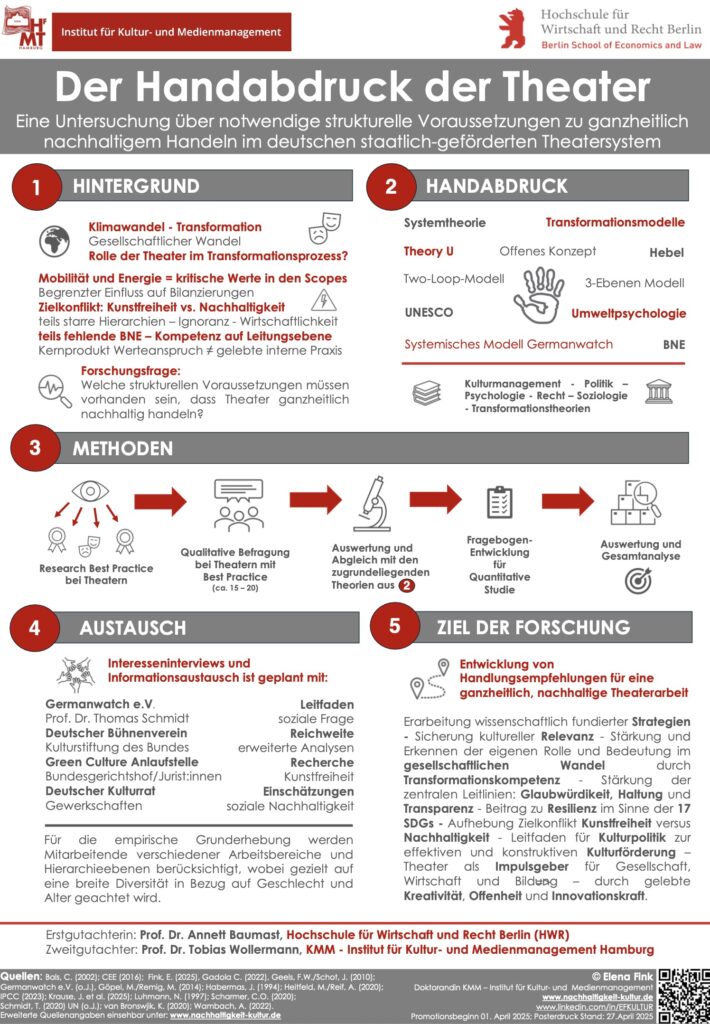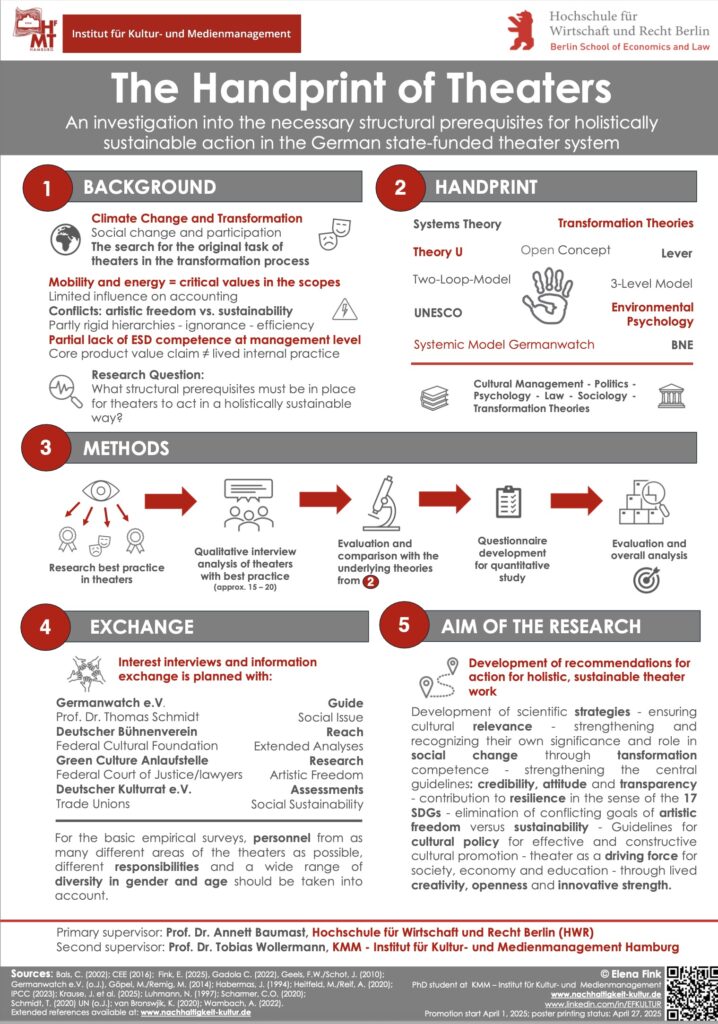Promotion
Der Handabdruck der Theater
Eine Untersuchung über notwendige strukturelle Voraussetzungen zu ganzheitlich nachhaltigem Handeln und zukünftiger Relevanz im staatlich geförderten deutschen Theatersystem
Erstgutachter:in: Prof. Dr. Annett Baumast
Zweitgutachter: Prof. Dr. Tobias Wollermann

Abstract – DE
Die Dissertation untersucht, wie Theater als Kulturinstitutionen zu einer nachhaltigen Transformation beitragen können. Im Zentrum steht dabei der sogenannte „Handabdruck“ – ein Konzept für positive, nachhaltige Handlungen, das über die bloße Reduktion des CO₂-Fußabdrucks hinausgeht. Ziel ist es, soziale, ökonomische und ökologische Nachhaltigkeit durch strukturelle Veränderungen und kooperative Ansätze systemisch zu verankern. Der aktuelle Forschungsstand zeigt, dass der Klimawandel gesamtgesellschaftliches Handeln erfordert. Zwar existieren erste Maßnahmen zur Emissionsreduktion in Theatern, doch fehlt es bislang an Studien, die den positiven Einfluss von Theater im Sinne einer aktiven Mitgestaltung nachhaltiger Transformation systematisch erfassen. Bestehende Instrumente wie der CO₂-Kulturrechner oder diverse Leitfäden verfolgen bislang vorrangig technische Bilanzierungsansätze. Empirische Ergebnisse aus einer eigenen qualitativen Erhebung im Rahmen der Masterarbeit sowie aus Projektdokumentationen der Kulturstiftung des Bundes verdeutlichen, dass nachhaltige Theaterproduktionen nicht selbstverständlich sind. Insbesondere fehlende Akzeptanz auf Leitungsebene, die Wahrung der Kunstfreiheit sowie Defizite in der Bildung für nachhaltige Entwicklung (BNE) stellen Herausforderungen dar. Auch bei geförderten ökologischen Produktionen konnte kein kausaler Nachweis für Handabdrücke erbracht werden. Die zentrale Forschungsfrage lautet daher: Welche strukturellen Voraussetzungen sind notwendig, damit Theater im staatlich geförderten deutschen Theatersystem nachhaltig und ganzheitlich handeln können – und ihre zukünftige Relevanz für sich selbst wie für die Gesellschaft erkennen? Ziel der Arbeit ist es, die bestehende Diskrepanz zwischen Anspruch und Realität im Umgang mit Nachhaltigkeit an öffentlich geförderten Theatern zu analysieren und darauf aufbauend wissenschaftlich fundierte Handlungsempfehlungen und Strategien zu entwickeln. Diese sollen zur langfristigen Sicherung der kulturellen Relevanz und zur Stärkung der Rolle von Theatern im gesellschaftlichen Wandel beitragen – im Sinne einer zukunftsfähigen Ausrichtung im Kontext der 17 Nachhaltigkeitsziele der UN.

Abstract – EN
This dissertation explores the role of theaters as cultural institutions in contributing to sustainable transformation. Central to the study is the concept of the “handprint” – a framework for positive, sustainable actions that extends beyond merely reducing the carbon footprint. The aim is to promote social, economic, and ecological sustainability through structural change and collaborative approaches. Current research underscores the need for society-wide action in response to climate change. Although initial measures to reduce emissions in theaters have been implemented, there is a notable lack of studies that examine the positive impact of theater on sustainable transformation. Existing tools such as the CO₂ cultural calculator and related guidelines primarily reflect technical approaches to carbon accounting.
Empirical insights drawn from qualitative interviews conducted as part of the author’s master’s thesis – alongside findings from project documentation by the german Federal Cultural Foundation – show that sustainable theater productions are far from self-evident. Challenges include limited acceptance of sustainability at the management level, tensions between ecological goals and artistic freedom, and a lack of education for sustainable development (ESD). Even in publicly funded ecological productions, it was not possible to provide causal evidence of measurable handprints.
The central research question therefore asks: What structural conditions are necessary for publicly funded theaters in Germany to operate sustainably and holistically, and to recognize their future relevance both for themselves and for society? The aim of the dissertation is to analyze the evident gap between ambition and reality in the current handling of sustainability within german publicly funded theaters and to develop actionable recommendations for sustainable transformation. The study aspires to provide scientifically grounded strategies for sustainable theater practices. These are intended to safeguard the cultural relevance of theaters, enhance their role in driving social change, and ensure their resilience and future viability in alignment with the 17 Sustainable Development Goals of the UN.
